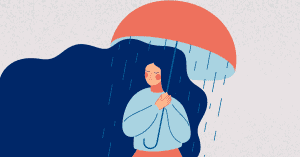It’s very common to have a favourite season in the year. Summer’s long, sunny days are very popular. Spring brings blossoming flowers, while autumn is full of incredible colours. Some people prefer winter weather to get cosy indoors and listen to the rain. On top of seasonal preferences, for some of us the seasons can have a greater impact.
Seasonal Affective Disorder (SAD) means that the weather can have a notable effect on mood, mental health and even physical health. Educator wellbeing and mental health is important and having an understanding of Seasonal Affective Disorder can help those experiencing it know how to combat it, and ensure others can best support them.

Understanding Seasonal Affective Disorder (SAD)
Seasonal Affective Disorder or SAD is a mood disorder that is related to the changes in seasons. This means for those with SAD it is likely to begin and end at the same time each year. Most commonly, the disorder begins to show symptoms in autumn continuing into the winter months. However, it is also possible to experience the depressive effects of SAD in the warmer months too.
You may have heard people refer to the “winter blues”. This may or may not be related to Seasonal Affective Disorder, but don’t let the colloquial reference make it seem like SAD is something that anyone should have to endure.
There are a number of factors that contribute to the development of SAD, and many link back to extended periods with a lack of sunlight during the colder months. While the sun still shines during winter, many don’t get out and about as much and there are fewer hours of daylight to do so. This limited sun exposure can lead to:
Lack of Vitamin D
Vitamin D is essential for optimal functioning and many studies show the connection between adequate Vitamin D for preventing and treating mental health conditions, promoting bone health and better sleep. When a person is not getting enough Vitamin D or have a Vitamin D deficiency, it can contribute to mental health problems, tiredness, restless sleep and digestive complaints.
Reduced levels of serotonin
Reduced serotonin levels have been found to be directly related to symptoms of depression. Serotonin is the key hormone that affects brain function including mood stabilisation and the feeling of being happy. It also impacts sleeping, eating and digestion. Vitamin D is involved in the activation of the neurotransmitters that ensure we get enough serotonin to keep us happy and healthy.
Impacted circadian rhythms
Rest is vital for bodies at every age to function to the best of their ability. During sleep we restore our energy levels and heal physically and cognitively. Without enough sunlight circadian rhythms or sleep patterns can be disturbed leading to a lack of sleep and in turn reduced immune efficiency, ability to heal and mood changes.
Identifying the symptoms
Many of the symptoms of SAD are similar to those of depression. If you’re noticing any of the following in yourself occurring cyclically with the seasons, or identify these signs in others, it is possible they are experience Seasonal Affective Disorder or other forms of depression, and may need support or mental health assessment and treatment.
Symptoms of SAD in may include:
- Feeling sad
- Reduced energy levels
- Sleep troubles (interrupted, oversleeping or insomnia)
- Appetite or weight changes
- Irritability
- Difficulty concentrating
- Withdrawal
Supporting those with Seasonal Affective Disorder
Staying aware of your own wellbeing and the wellbeing of those around you is important to ensure people can get any support they may need.
If you notice the symptoms of Seasonal Affective Disorder, or other types of depression, in yourself or those you work with, help them to access appropriate care. This may be reaching out to a doctor or mental health professional.
Treatment options may include light therapy, which involves the use of a light box to provide artificial sunlight. There are also medications and talk therapies to support those with SAD, or a combination of treatments might be necessary.
Help is available to improve mental health in aged care
Supporting the mental and physical health of educators is crucial for their own health and wellness as well as the quality of care delivered to children. There are many resources you can recommend and/or support individuals to access for help. We have compiled some useful wellbeing resources here for anyone who is looking to reach out for support for Seasonal Affective Disorder (SAD) or their mental health more broadly.



